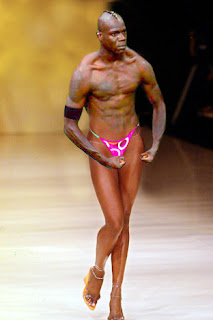Robbie Rogers. Photo: PA
I've spent the better part of the last few days trying to figure out how to write about Robbie Roger's courageous decision to come out. And I think it makes sense to take address this in three parts: 1) Robbie's words; 2) The reaction from fans and the international soccer community; and 3) Homophobia in the game and where we go from here.
Robbie's Words
My first reaction to reading Robbie's statement (you can read it in its entirety
here and I would highly recommend that you do so before continuing on) was complex: I was incredibly proud of him for choosing to share his life openly with us all; I was saddened for him that he'll be stepping away from the game that he loves and has helped make him who he is; I was scared that the reaction would be so negative and toxic that it would cause him greater pain; I was excited that maybe, just maybe, we're entering into a new space where players are able to genuinely speak about and be themselves. But mostly, I was hopeful for Robbie...that he'll be able to find some peace and security amidst all of the craziness that has come about (and will continue to arise) because of his decision to be unspeakably brave. And I want to let his words stand on their own, because they are powerful. Here's how he ended his post:
Now is my time to step away. It’s time to discover myself away from football. It’s 1 A.M. in London as I write this and I could not be happier with my decision. Life is so full of amazing things. I realized I could only truly enjoy my life once I was honest. Honesty is a bitch but makes life so simple and clear. My secret is gone, I am a free man, I can move on and live my life as my creator intended.
The Reaction from Fans and the International Soccer Community
This weekend has made me unspeakably proud to be a football fan. It has made me unspeakably proud of so many of the players that I admire on the pitch because they've shown compassion and class and respect off of it for one of their own (and they've made it clear, too, that Robbie is one of their own). The Seattle Sounders released a
video in support of Robbie, with players and coaches offering words of encouragement and solidarity. MLS released a statement of support and posted a
video of several of Robbie's former teammates praising him and standing with him. People from US Ambassador to the United Nations (and soccer mom) Susan Rice to actor Zachary Levi posted words of encouragement and support on Twitter. The
Huffington Post's article also includes a great gallery of support from his fellow USMNT players and other soccer stars tweets...and that's not including the support he received from the USWNT, including Ali Krieger and Abby Wambach.
(As a small side note, I'd like to publicly thank Chris Kluwe (and not just because he plays for my Minnesota Vikings) and Carlos Bocanegra (Captain America, I salute you!) for making it clear that coming out doesn't have to be a reason for leaving the game)
If you want to feel better about the world, search Twitter for @robbierogers. The fact that 99.99999% of the responses have been not just positive but welcoming, embracing, and supportive will make you feel a little bit better about humanity and a lot better about the state of soccer as a sport.
Homophobia in the Game and Where We Go From Here
I want to push back on one thing in all of this. While, yes, combating homophobia in football is vital and necessary, there seems to be a lot of assertion (see the PFA exec's comments
here for example) that things won't change unless players come out while still playing the game. Fighting prejudice is the responsibility of EVERYONE, not just the players it happens to impact. If only Kevin-Prince Boateng had walked off during AC Milan's match a while back, it would be a different story; the fact that the entire team took a stand and walked off is important. All of us in the soccer community, whether we are players or fans or coaches or executives, have a responsibility to those of us who may happen to be gay or bisexual or pansexual or whatever. We ALL have to fight against discrimination. That means challenging the perception of orientation and gender presentation being linked with athletic ability (see
Michael Becker's comments about the German NT at the 2010 World Cup for an example of how NOT to talk about orientation and gender presentation as they relate to athletic ability). We need to challenge the assumption that to be gay is to somehow be less than or unmanly or somehow othered in a way that reduces a person's ability to contribute to a team.
While it's not clear whether Robbie is choosing to step away from the game in order to figure out who he is away from it or because he was unsure about playing after coming out, we should all be clear that those are two separate issues and we shouldn't assume that he is retiring solely because he came out. That seems to be the assumption on the part of many; perhaps it is the case and perhaps it is not. Either way, something needs to change. And, as Grant Wahl pointed out on Twitter, he says he's stepping away, not retiring.
While there are no openly out players in the German Bundesliga, many German footballers have been public in their support of any player who wants to come out (and others, like German captain Philipp Lahm, have expressed dismay that it's not a safe enough environment yet). Given the outpouring of support and respect from players and the league in the US for Robbie, it's clear that the momentum is going in the right direction. Yes, there is homophobia in the game. There's homophobia everywhere. But that's all the more reason for all of us to work to combat it. We can't put it all on the shoulders of one or two individuals, expecting them to come out and bear the burden of being the name and face of this issue; we all need to be the name and face behind this issue. MLS clubs need to continue to support their players and need to start to take public stands against discrimination in all its forms. FIFA talks a lot about racism; they need to start talking about homophobia. And all of us who love this game need to work actively to change the game's culture. That might mean we put ourselves in situations where we challenge the language of others at matches or that we work with our club to do outreach within the LGBTQIA community or that we offer our knowledge and skills and expertise to our clubs to help educate players and coaches and other fans. But it means that we need to all work together, because this isn't just a problem that impacts the players like Robbie who are brave enough to share their story with us; it is a problem period whenever anyone is not able to be fully themselves and pursue the career that they love.
Want to get involved? Join the ranks of
Red Card Homophobia. Ask your local club to join in the Red Card Homophobia campaign with
photos like these Ajax players. Write letters to the editor in support of Robbie that also challenge the idea that gender presentation, sexual orientation, and athletic ability are somehow linked. Tweet about it. Blog about it. Support local LGBTQIA clubs and leagues and encourage your local MLS team to play friendlies with local LGBTQIA clubs. Talk about it. Because together, we can make a difference.
Bex is a PhD student in Social Ethics whose research focuses on the social ethics of professional club soccer. A die-hard Bayern Munich fan, she currently lives in Denver and also writes as part of the FC Hollywood team. You can follow her on Twitter @beckella.

























